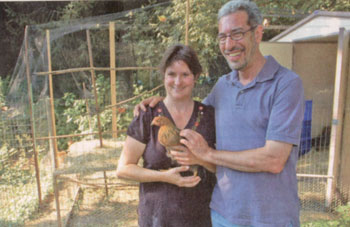Source: Springfield Sun
Date: July 10, 2008
Byline: Nick Malinowski
There ain't nobody here but us chickens
Flourtown residents keep coops for fun and breakfast eggs, and it's all legal

Although animal husbandry is not typically associated with Springfield Township, several Flourtown residents have recently taken up raising chickens and have found the experience rewarding.
Along with fresh egg production, chickens make great pets, according to Nancy Parsons and Doug Heller, who bought seven chicks nine weeks ago and house them in a homemade coop in their backyard on West Mill Road.
"I come home from work, I get a glass of wine and I sit down and watch my chickens," Parsons said in an interview Tuesday. "They are so relaxing. So fun to watch."
The chicks cost $2 each and were approximately three days old when they arrived from their hatchery in Iowa via the U.S. Postal Service.
There are many different breeds of chickens from which to choose, depending on the climate and the types of eggs desired, Parsons said.
"We got chickens for the eggs," neighbor Laurie Jenkins said. "I didn't know they were so amazing. They have this reputation for being dumb, but they aren't."
Jenkins began raising chickens last year and now has 16. They produce more eggs than her family can consume, but Jenkins has found the eggs to be good currency in the community.
"We've developed a great barter system. There is such a demand for good, humane, local products," she said.
Parsons, Heller and Jenkins, along with eight others from Springfield, Whitemarsh, Cheltenham and Upper Dublin, formed a co-op in February called Chicken Owners Outside Philadelphia, or COOP.
The group has a Web site at www.chickenowners.com and now has 26 members, Parsons said.
Along with buying feed and chicks at bulk rates, COOP members help educate each other about both the practical and legal nuances of raising chickens.
In Springfield Township there are few legal hurdles. Section 114-41 of the township zoning code provides for "the keeping, raising or management of livestock as an accessory use, provided that livestock shall-be kept under safe conditions, with a potable water source and with adequate vehicle access." In Abington and Upper Dublin, however, residents who want to keep chickens are forced to seek relief in the form of a variance from the local zoning hearing board, which can be expensive and time consuming, Parsons said.
One of COOP's goals is to create a model ordinance permitting chicken keeping for neighboring municipalities to adopt, Heller said.
Chickens need only about 4 square feet of space to be comfortable, and they have proven to be very low maintenance, Parsons said.
Besides chicken feed, they eat table scraps and forage for worms and bugs, including mosquitoes, ticks and Japanese beetles.
After a chicken turns 6 months old, she will lay up to one egg per day for two or three years, and the difference between fresh and store-bought eggs is obvious, Parsons said.
"It's like the difference between a nice bottle of wine and Boone's Farm. Once you've had the nice wine, you can't really go back to the Boone's Farm" Heller said.
The chickens have been a social asset, Heller said, since the owners meet regularly and tend each other's flocks if someone is out of town. They are also magnets for children and the uninitiated who are curious about what is going on, Heller said.
"The more we can interact and intermingle, the better the world is," Jenkins said.

